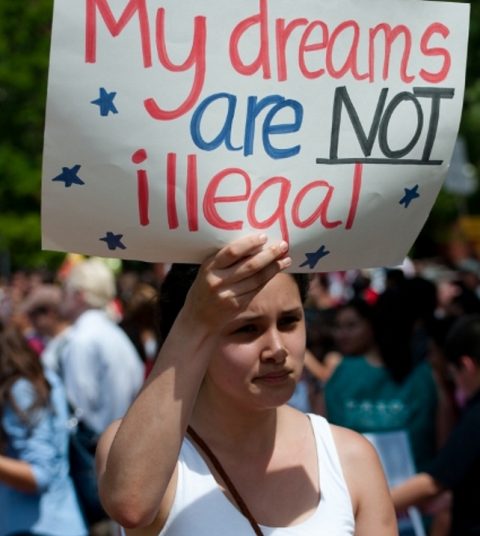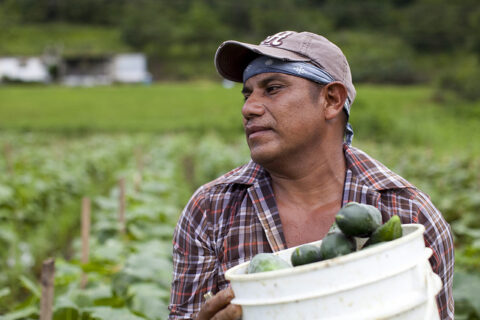Reform

Associated Press Issues Misleading Defense of Term “Illegal Immigrant”
Unlike lawyers and policymakers, journalists have an obligation to use language that ordinary people understand. Although the practice is generally helpful, it can sometimes result in oversimplification, or sacrificing accuracy for the sake of supposed clarity. A perfect example is the memo issued by the Associated Press last week endorsing use of the term “illegal immigrant.” Read More

A Growing Consensus on Supporting Immigration Reform
Immigration reform is not a “liberal” cause; it is a common-sense cause that appeals to people from a variety of political persuasions. More than a few conservative intellectuals, commentators, politicians, religious leaders, and law-enforcement officials favor revamping the U.S. immigration system to make it more responsive to the economic demands, social realities, and security concerns of the 21st century. This stance represents not only compassion, but enlightened self-interest. A growing body of evidence has quantified the enormous contributions that immigrants make to the U.S. economy through their labor, entrepreneurship, buying power, and innovation. Moreover, demographic trends point clearly to the growing electoral power of naturalized immigrants and to the native-born children of immigrants. In other words, being anti-immigrant in this day and age is self-destructive from both an economic and a political standpoint. Read More

Got Clarity? “Illegal Immigrant” Is More than Just a Term
Over the last few weeks, New York Times Public Editor Margaret Sullivan has been weighing a challenge from fellow journalist and self-described “undocumented immigrant” Jose Antonio Vargas—drop the use of “illegal immigrant” as the Times default description of the 12 million undocumented people in the United States. Sullivan invited and received public comment on the challenge, much of which made subtle and nuanced pleas to use terms that were less insulting and more accurate. This week, calling her decision somewhat anti-climactic, Sullivan recommended that the Times stick with its current style guide because illegal immigrant is a term that is “brief, descriptive, and “gets its job done in two words that are easily understood.” Read More

Use of Segregation in Immigration Detention has Harmful Effects
The U.S. immigration system continues to detain more and more noncitizens in federally-operated detention facilities, in private prisons, and in state and local prisons and jails across the country. Currently, DHS detains approximately 34,000 persons every night, the majority of whom have no criminal history. Over the last several years there have been numerous reports on the miserable conditions found within these facilities. Read More

Agriculture Industry Harmed by Restrictive State Immigration Laws
The American agricultural industry is facing billions of dollars in losses due to labor shortages resulting from recent anti-immigrant laws passed in various states around the country. The American farming industry is heavily dependent on undocumented workers, and according to a recent article in Time Magazine, has had an extremely difficult time replacing those who have fled as a result of laws like Arizona’s SB 1070 or Alabama’s HB 56. Read More

As Chicago Passes Anti-Detainer Ordinance, TRUST Act Awaits Signature in California
Lost amongst media coverage of the ongoing teachers’ strike was the passage in Chicago last week of a historic measure that largely prohibits local police from detaining individuals on behalf of federal immigration authorities. Dubbed the “Welcoming City Ordinance,” the measure makes Chicago the latest jurisdiction to push back against immigration “detainers,” the lynchpin of the controversial Secure Communities program. Read More

No Paid Sick Days for Immigrant Caregivers Risky to Workers, U.S. Economy
By Elisa Batista, Women Immigrants Fellow, New America Media. In 91-year-old Elda Frank’s apartment is a scenario that plays out every moment of every day. An immigrant caregiver with no paid sick days scrambles for backup when she becomes ill on the job. In caregiver Paula Osorio’s case, she called Frank’s son, Bruce, and offered to send her partner, Roberto, in her place. Read More

Immigrant Integration is a Two-Way Street
The process by which immigrants integrate into the economic and social fabric of the United States is very much a two-way street. Naturally, immigrants must harbor the desire to climb the socioeconomic ladder of success. But there must be a ladder for them to climb. If the community within which immigrants live and work makes the collective decision to deprive them of opportunities, then their upward mobility is hindered—to the social and economic detriment of the entire community. Yet, if the community actually welcomes newcomers and helps to facilitate their upward mobility, then the community eventually reaps the rewards of having workers and neighbors who are more highly skilled, more integrated, and more heavily invested in the community itself. Read More

A Look Backward and Forward at Immigration Platforms
Eight years ago, the similarities between the Republican and Democratic platforms on the issue of immigration reform were striking. The 2012 immigration planks for both parties are equally striking, but for the opposite reason. Where 2004 demonstrated a unified vision of a broken system requiring reform, 2012 represents a virtual breakdown in agreement at least in official party documents, on how to go forward on immigration. Comparing the evolution of the platforms from 2004 to 2008 to 2012 offers some insight into what has gone wrong in the immigration policy debate, and demonstrates why both sides need to come up with new, creative solutions to the continuing immigration policy crisis. Read More

California DREAMers Exhibit High Levels of Civic Participation, Yet Face Significant Hardships
By Caitlin Patler, Ph.D. Candidate in Sociology, UCLA There are roughly 5 million undocumented children and young adults currently living in the U.S. today, 24% (or 1.1 million) of whom live in California. As in other states, California’s undocumented youth face a unique and challenging paradox. On one hand, they work hard, excel academically, participate in their communities and have high educational and career aspirations in the only country they’ve ever known. On the other hand, their immigration status severely limits their opportunities, aspirations and ability to contribute fully to U.S. society. A new research brief, co-authored by Veronica Terriquez and this author, highlights the experiences of undocumented youth in California—many of whom disproportionally experience economic and personal hardships. Read More
Make a contribution
Make a direct impact on the lives of immigrants.
